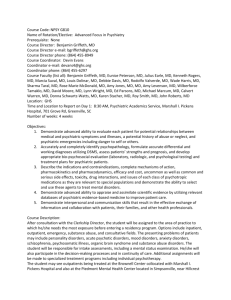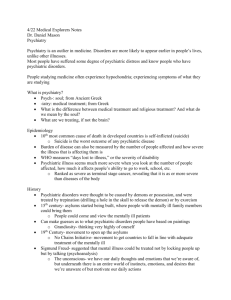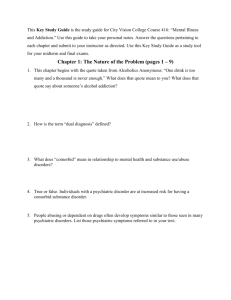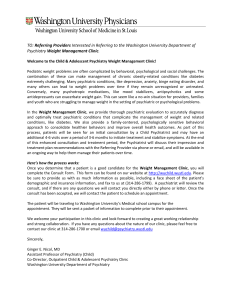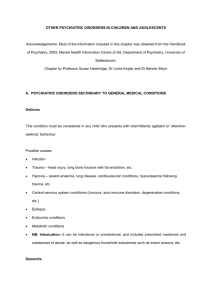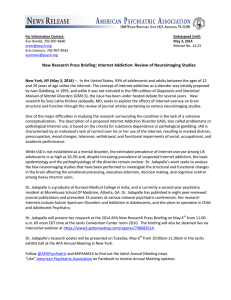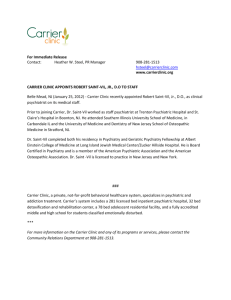PSYCHIATRY CLERKSHIP
advertisement
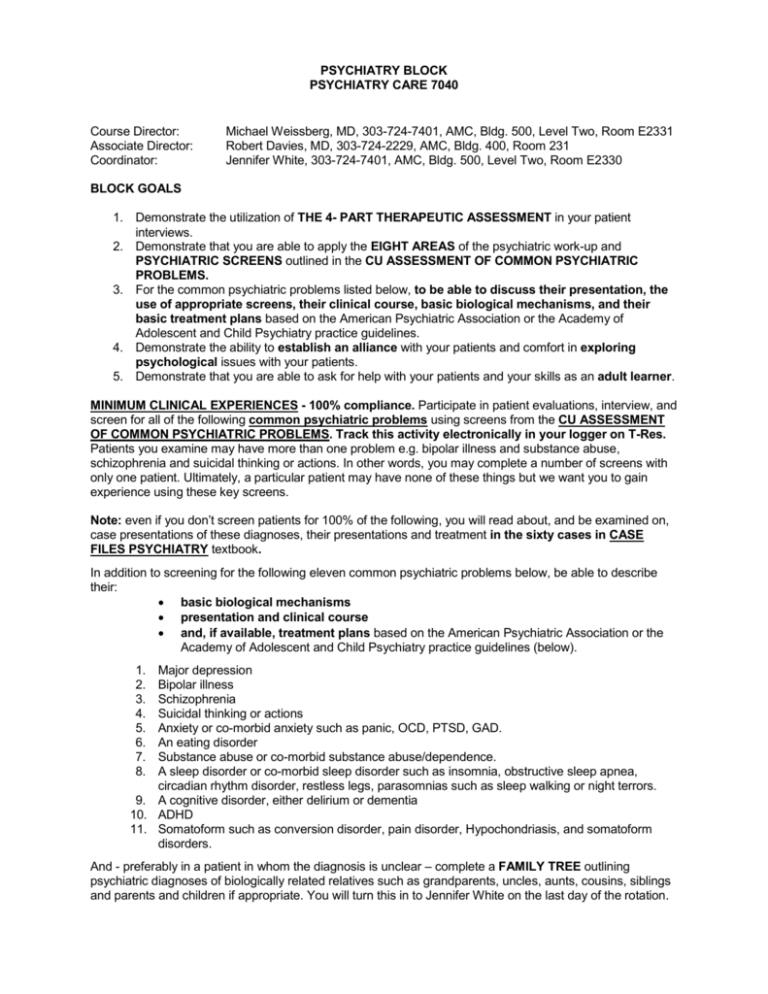
PSYCHIATRY BLOCK PSYCHIATRY CARE 7040 Course Director: Associate Director: Coordinator: Michael Weissberg, MD, 303-724-7401, AMC, Bldg. 500, Level Two, Room E2331 Robert Davies, MD, 303-724-2229, AMC, Bldg. 400, Room 231 Jennifer White, 303-724-7401, AMC, Bldg. 500, Level Two, Room E2330 BLOCK GOALS 1. Demonstrate the utilization of THE 4- PART THERAPEUTIC ASSESSMENT in your patient interviews. 2. Demonstrate that you are able to apply the EIGHT AREAS of the psychiatric work-up and PSYCHIATRIC SCREENS outlined in the CU ASSESSMENT OF COMMON PSYCHIATRIC PROBLEMS. 3. For the common psychiatric problems listed below, to be able to discuss their presentation, the use of appropriate screens, their clinical course, basic biological mechanisms, and their basic treatment plans based on the American Psychiatric Association or the Academy of Adolescent and Child Psychiatry practice guidelines. 4. Demonstrate the ability to establish an alliance with your patients and comfort in exploring psychological issues with your patients. 5. Demonstrate that you are able to ask for help with your patients and your skills as an adult learner. MINIMUM CLINICAL EXPERIENCES - 100% compliance. Participate in patient evaluations, interview, and screen for all of the following common psychiatric problems using screens from the CU ASSESSMENT OF COMMON PSYCHIATRIC PROBLEMS. Track this activity electronically in your logger on T-Res. Patients you examine may have more than one problem e.g. bipolar illness and substance abuse, schizophrenia and suicidal thinking or actions. In other words, you may complete a number of screens with only one patient. Ultimately, a particular patient may have none of these things but we want you to gain experience using these key screens. Note: even if you don’t screen patients for 100% of the following, you will read about, and be examined on, case presentations of these diagnoses, their presentations and treatment in the sixty cases in CASE FILES PSYCHIATRY textbook. In addition to screening for the following eleven common psychiatric problems below, be able to describe their: basic biological mechanisms presentation and clinical course and, if available, treatment plans based on the American Psychiatric Association or the Academy of Adolescent and Child Psychiatry practice guidelines (below). 1. 2. 3. 4. 5. 6. 7. 8. Major depression Bipolar illness Schizophrenia Suicidal thinking or actions Anxiety or co-morbid anxiety such as panic, OCD, PTSD, GAD. An eating disorder Substance abuse or co-morbid substance abuse/dependence. A sleep disorder or co-morbid sleep disorder such as insomnia, obstructive sleep apnea, circadian rhythm disorder, restless legs, parasomnias such as sleep walking or night terrors. 9. A cognitive disorder, either delirium or dementia 10. ADHD 11. Somatoform such as conversion disorder, pain disorder, Hypochondriasis, and somatoform disorders. And - preferably in a patient in whom the diagnosis is unclear – complete a FAMILY TREE outlining psychiatric diagnoses of biologically related relatives such as grandparents, uncles, aunts, cousins, siblings and parents and children if appropriate. You will turn this in to Jennifer White on the last day of the rotation. Evaluation & Treatment: Be able to discuss APA “quick reference guide” practice guidelines and updated “watch” of the following: (http://www.psych.org/psych_pract/treatg/pg/prac_guide.cfm) or http://www.aacap.org/page.ww?section=Practice+Parameters&name=Practice+Parameters for children. Diagnoses Revision ADHD Vol 46 Jul 2007 PDF Acute Stress Disorder and Posttraumatic Stress Disorder (Nov 2004) PDF Alzheimer’s Disease and Other Dementias (Oct 2007) PDF Bipolar Disorder (Apr 2002) PDF (Nov 2005)PDF Borderline Personality Disorder (Oct 2001) PDF (Mar 2005) PDF Delirium (May 1999) PDF (Aug 2004) PDF Eating Disorders (May 2006) PDF HIV / AIDS (Nov 2000) PDF (Apr 2006) PDF Major Depressive Disorder (Apr 2000) PDF (Mar 2005) PDF Obsessive-Compulsive Disorder (July 2007) Panic Disorder (Feb 2009) PDF Psychiatric Evaluation of Adults (May 2006) PDF Schizophrenia (Apr 2004) PDF Somatoform disorders On Blackboard Substance Use Disorders (May 2006) PDF Suicidal Behaviors (Nov 2003) PDF (Apr 2007) PDF OTHER REQUIREMENTS I. Medical Student Study Session (exams, current topics, week review): Wednesdays 1:30-3:30 PM Anschutz Medical Center, Bldg. 500, level 2 in the Psychiatry Medical Student Conference Room # E2329. A description of the seminar and weekly schedule is at the end of the clerkship requirements. II. Consultation Service: Consultation services are great places to fulfill many of your screen requirements. The Consultation-Liaison (C-L) Service provides consultations to patients on the medical inpatient units at AIP, VAMC, DHMC and TCH. Students at DHMC will sign up with Barbara Duncan during site orientation. Students at MHCD also do consults at DHMC; those of you at Vine Street will do consultations on Friday afternoons. Students at VAMC should call Dr. Mitzi Wasserstein, 303-399-8020 ext 3516, for consultation details at VAMC. Students at TCH should call Dr. Harrison Levine, 720-777-6103 for Psychiatric Consultation Liaison and Emergency Services. Students at other locations may do consultations as arranged at their particular clerkship site. 2009/2010 Page 2 of 7 III. Pediatric/Child Psychiatry (elective) If you are interested in seeing children or adolescents during your rotation – and we think this is important for any of you who are planning to treat families or kids – please review the options below. Be sure to discuss which of the two clinic times would work best for you to join with your attending. The clinic is located on the 2nd floor west wing of Building 500. Please let the west front desk staff know that you are attending the clinic and want to be directed to the “Attending” Area. Tuesday is a general clinic with an emphasis on medication management. On Tuesday, the PGY III residents in general psychiatry have child clinic form 2:00 – 6:00 PM. Dr. Phil Weintraub and Dr. Debbie Carter are faculty supervisors. Friday clinic is a mix of very young child clinic, medication management and ongoing psychotherapy. On Friday, clinic is held from 8:30 AM -12 noon. The child and adolescent Psychiatry chiefs, Drs. Haley and Lipman are present in the Friday clinic. Drs. Cook, Savin, Frankel and Carter are faculty supervisors. Please email Dr. Carter if you plan on attending on Tuesdays and Drs. Haley and Lipman if you plan on attending Friday. If you choose this option, also copy jennifer.white@ucdenver.edu. debbie.carter@ucdenver.edu carmen.haley@ucdenver.edu benjamin.lipman@ucdenver.edu Most of the AHEC locations can provide a child experience as well. IV. Denver CARES (elective) This is a great experience. If you are interested in participating in Denver CARES for one or two evenings during this rotation, contact Audrey Vincent at 303-436-8741 or via email audrey.vincent@dhha.org and she will assist you in arranging this. If you choose this option, also copy jennifer.white@ucdenver.edu 2009/2010 Page 3 of 7 GRADE REQUIREMENTS At the mid-point of your rotation, we will check with your attending about your progress and also review your logger data. Your attending should meet with you at that time and give you written feedback at that time and also review your logger data in order to ensure that you are meeting the requirements of the rotation. Turn in the mid-block evaluation form on the third Wednesday of the rotation. In this way, you should not be surprised by your final clinical evaluation. This timing also provides you the opportunity to respond to feedback and complete your block requirements. 1. Your evaluation of your clinical performance from your site attending counts for 60% of your final grade. Your attending will recommend a clinical grade of pass, high pass, honors, or fail. You will receive 75 points for pass, 90 for high pass, and 100 for honors. 2. Your shelf examination score counts for 20% of your grade; the average of your three Wednesday examinations based on CASE FILES counts for 20% of your grade. 3. To receive an overall grade of HONORS for the rotation you must receive a combined score of at least 95. A score between 92 and 94 results in a HIGH PASS, and a score of 70 is required for a PASS. 4. In addition, in order to pass the rotation you need to pass your presentation, complete at least 70% of the clinical experiences, complete your family tree, and participate in the End of Block Focused Clinical Assessment. 5. The shelf examination is from the NBME; it contains ~100 questions which you have two hours and 10 minutes to complete. You are not to discuss the contents of this examination with anyone. This is a difficult exam which requires reading skills as well as content knowledge. Students have found it useful to review exam contents on the NBME website and to utilize review books and review questions. In addition, our weekly examinations and quick reviews during current topic presentations should help prepare you for the shelf examination. If you score below 60 on the shelf examination but receive a robust clinical evaluation, you will have the opportunity to take a make-up shelf examination. If you fail the shelf and your clinical evaluation is marginal, you will have to repeat the rotation. The final examination is proctored and will be held on the last day of the clerkship. You will have 2 hours and 10 minutes to complete the examination. In order to receive your final grade, complete the electronic logger, turn in a family tree, signed mid-block evaluation, return your copy of CASE FILES PSYCHIATRY, and please complete your evaluation of the rotation, attending, and, if you had one, your resident. 6. End of Block Focused Clinical Assessment provides an opportunity to demonstrate use of screens from the CU ASSESSMENT OF COMMON PSYCHIATRIC PROBLEMS. You will see two patients from the list of 10 common problems and be given a brief written history. We don’t expect you to complete a full history and exam but rather perform focused assessments of what you judge to be the patient’s main problem or problems. This focused clinical assessment will be held on the last day of the rotation (4th Friday) from 1:00 to 3:00 PM, Center for Advancing Professional Excellence, Education 1, Level Four, Room 4103. Be sure to take the South stairs or elevator as the North side is card key access only. The receptionist will sign each of you in and direct you to the classroom 4103. 2009/2010 Page 4 of 7 ADDITIONAL RESOURCES I. Medical Student Membership in the American Psychiatric Association Medical student membership in the American Psychiatric Association is open to all medical students. The registration fee is waived. If you are interested in enrolling as a member, please go to their medical student membership at: http://www.psch.org/med_ed/how.cfm Listed are some of the benefits of medical student membership: o o Subscriptions to Psychiatric News, The American Journal of Psychiatry, and Psychiatric Residents' Newsletter. Directory of Psychiatric Residency Training Programs. Jennifer White has the complete list of benefits. If you have any questions, call 303-724-7401 or e-mail her at jennifer.white@ucdenver.edu. II. Reading and Text o o o o For rapid information, when available, UPTODATE is fine. For a free, major text which you may want to consult when you need more information in depth: Go to HSClibrary.uchsc.edu; go to HOME and look at ALL Databases, Click on PsychiatryOnline or go directly to www.psychiatryonline.com and you are there. There are multiple resources at that site but the major text is TEXTBOOK OF CLINICAL PSYCHIATRY. A useful resource: Essential psychopharmacology : neuroscientific basis and clinical applications. Stephen M. Stahl ; Available in the HSL and TCH libraries (ISBN 052156011X), and at MHCD (Drs. Ryan and Menninger) REQUIRED – Read the 60 psychiatric cases and exam questions in CASE FILES PSYCHIATRY By Toy & Klamen, Lange, 2007. You will be quizzed on each of the cases for credit (see Medical Student Study Sessions) H-Student demonstrates advanced level of performance/ competency in course requirements HP-Student demonstrates above expected level of performance/ competency in course requirements P- Student demonstrates expected level of performance/ competency in course requirements F- Student does not demonstrate expected level of performance/ competency in course requirements. PR-Student demonstrates expected performance/ competency in the course requirements after remediation. IP- Student is unable to complete requirements for a block due to illness or extenuating experiences I – Student is unable to completed requirements with a less than passing grade at the completion of the block. All grades remain permanently on the student’s transcript expect IP and I, which are replaced with the appropriate grade after the student has completed the course. 2009/2010 Page 5 of 7 III. Medical Student Study Sessions Wednesdays 1:30-3:30 PM AMC Bldg. 500, room E2329. Exams based on CASE FILES. Current topic presentations will be from current articles from various journals, a complete listing in the Current Topics section of your student packet. Week 1 1:30 – 3:30 PM. Welcome and orientation o The psychiatric evaluation & safety o Chose articles for Current Topics from table of contents from current journals that we will distribute (see below). o For the next three meetings, review the cases in Case Files Psychiatry listed for each week for your timed, 24 to 36 question, 25 minute practice exams. When studying, please READ THE CASES AND DISCUSSIONS, NOT JUST THE QUESTIONS. Week 2 1:30 – 2:00 PM Timed 25 minute exam - ~25 questions from 20 Case Files Psychiatry cases: o Schizophrenia and other psychotic disorders o Mood Disorders o Anxiety Disorders 2:00 – 3:15 PM Current Topics: 10 minute presentations Week 3 1:30 – 2:00 PM Timed 25 minute exam - ~25 questions from 21 Case Files Psychiatry cases: o Substance related disorders o Delirium, dementia, cognitive disorders o Personality disorders o Adjustment disorder 2:00 – 3:15 PM Current Topics: 10 minute presentations Week 4 1:30 – 2:00 PM Timed 25 minute exam - ~36 questions from 19 Case Files Psychiatry cases: o Mental retardation and pervasive developmental disorders o ADHD and conduct disorder o Somatoform disorders o Factitious and dissociative disorders o Eating disorders o Sleep o Malingering o Tourette disorder o Separation anxiety disorder o Gender Identity disorder o Fetishism 2:00 – 3:15 PM Current Topics: 10 minute presentations Current Topics: o At our first meeting you will choose an article/review from a current journal o Presentation is 10 minutes - maximum - with 3-5 minutes for discussion. Add something interesting. No death by power-point. For instance, you can update your topic by looking at one or two more current papers, or go to YouTube, etc. o Bring slides on a flash drive. More than 8 slides likely will be too many. o Email Jennifer your presentation for your peers at remote locations, jennifer.white@ucdenver.edu. o Cover 1. Exam review: as prep, outline illness/issue which is focus of your paper in one or two slides 2. Context and question of review or study 3. Study or review findings 4. Speculate what you learned from your review might impact your - and practice*** Grading: Is on pass/fail basis. 2009/2010 Page 6 of 7 Student Name: _______________________________ Mid-block evaluation & log review performed by ________________________________ on _________ (attending signature) (date) (Please turn this in on the third Wednesday of the rotation) Dear Attending, You will be rating students on their specific achievement of competencies which range from Observer to Novice Reporter, Reporter to Novice Interpreter, Interpreter to Novice Manager through New Innovations at the end of the rotation. Be sure to meet with the student midway through the rotation to ensure the student is aware of their progress and give them a copy of this completed form. The key areas of a students’ performance are: Check upon review 1. Medical Knowledge 2. Clinical Care 3. Communication 4. Professionalism 5. Systems based practice 6. Practice-based learning and improvement. Student’s logger demonstrates they are meeting clinical experience. Are there any areas the student is deficient in? If so, explain and provide remediation steps: ___________________________________________________________________________________ ___________________________________________________________________________________ ___________________________________________________________________________________ ___________________________________________________________________________________ ___________________________________________________________________________________ ___________________________________________________________________________________ ___________________________________________________________________________________ 2009/2010 Page 7 of 7
